On Ohlauer Strasse in Berlin there is a building that once housed a co-educational high school. Later it stood empty. Now refugees live in it. Behind a gate with two guards, under constant surveillance.
‘No, no! You can’t take photos here. Outside the bars you can,’ I hear a few seconds after I decide to enter the school area. Alongside the guards I also see a smiling man coming towards me. He wears a winter cap and a light down jacket. His name is Alnour Ahmad-Hassan, a resident of the school. He calms the guard down.
‘Okay, let’s get out of here. At the corner there is a café. We can sit there and talk in peace,’ Alnour suggests.
‘So this is how it is here now?’ I ask, surprised.
‘Yes, more or less. You see, they are isolating us here completely.’
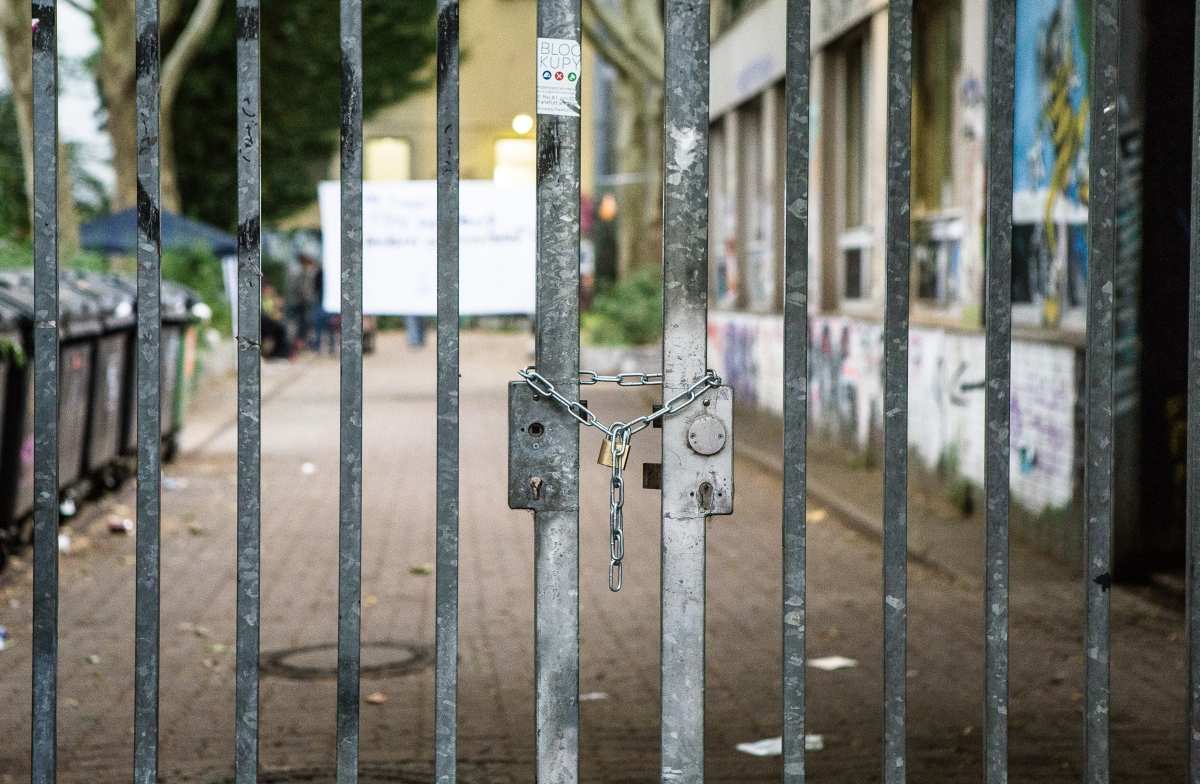
***
‘What would you like to know?’ asks Alnour several minutes later, sipping his black coffee.
‘Everything, basically.’
‘If everything, it would be good to start at the beginning.’
‘Meaning when?’
‘Let’s say the beginning is August 2012. It was two months before October when we reached Berlin. Back then our movement had only begun. Two refugee groups started from the Lagers, one from Brunswick by bus, the other from Würzburg on foot.’
Two refugee groups started from the Lagers, one from Brunswick by bus, the other from Würzburg on foot.
‘And what group were you in?’
‘In the bus one. The Lager where I was staying was unbearable. Far from the city, a one-hour drive from any buildings. We had practically no medical care there. We couldn’t move. How many lands are there in Germany? Sixteen, right? And we were allowed to move around within one only. The police were everywhere. It felt like prison. More than ten people were packed in one room. These were conditions for animals, not for people. We decided to escape from that place. In Brunswick there were many Sudanese because they had divided people by nationality. I come from Sudan, that’s why I ended up there. The refugees from Eritrea are transported to Frankfurt. We thought we would go where we had some contacts. It turned out that we mainly knew people from Berlin’s Kreuzberg. There are many migrants here so they mix and we can live somehow.’
‘Did you plan your escape long?’
[easy-tweet tweet=”These were conditions for animals, not for people.” user=”krytyka” hashtags=”politicalcritique”]
‘It took us about two weeks to organize a bus. We just rented it for money we got from people who supported us. During the events we’re organizing right now there is also always somebody with a can around so anybody can make a donation for our movement. Of course we always try to say what the money is for. Back then it was for the bus and some tents.’
‘Did the Lager guards know that you were planning to escape?’
‘I don’t know, to be honest. It didn’t bother us much then. Because when we knew we would go we felt free at last and not like criminals they were trying to make us feel. We knew we had our rights and began fighting for them finally. We did it all for three things: freedom of movement, improving conditions in the Lager and fighting against deportations. On the day the bus came, we were threatened that they would take us to court. And let them take us. I’m no criminal and I’m not afraid of courts. They were also saying that we would have to pay high fines or something, thousands of euros. I told them they would not see one eurocent. They were also saying something about social work. Well, that’s new! All the time when we’d wanted to work we’d hear it had been impossible. And now to punish us they wanted to give us work. If there had ever been anyone who broke a law then it was those who decided about conditions in which we were supposed to stay, not us.
All the time when we’d wanted to work we’d hear it had been impossible.
So this is how it was in the Brunswick team, more or less. At the same time we were in touch with the people from Würzburg who were preparing their march. Turgay from Turkey was quite active there; have you met him yet?’
***
Several days before talking to Alnour I had arranged to meet in Café Kotti; it’s one of these places where you’ll definitely run across some leftist activist on your way from the table to toilet. I knew my interviewee from the photographs made by press photographers who had reported on the march from Wurzburg and the subsequent occupation of Oranienplatz by the refugees. Strong jaw, broad nose, thick but trimmed scruff, shrewd and intelligent eyes. Rimless glasses, with delicate wires. Almost always smiling. That was the image of Turgay I remembered from the photographs.
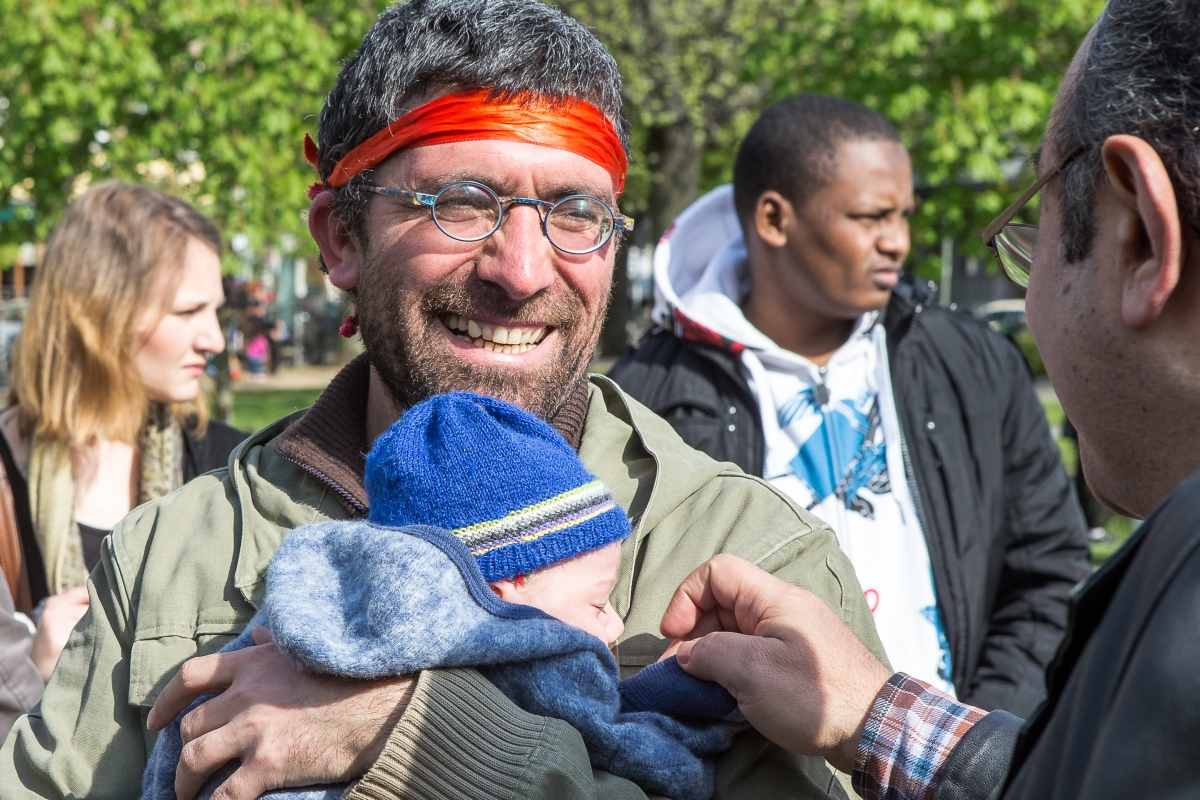
That is why I had to walk to and fro in the café several times before I realized that the grim-looking guy at the entrance was in fact my interviewee. No sooner had we ensconced ourselves at the table than I remembered the look I had seen in the pictures. Now he had a greyish beard and longish hair, curling into dreadlocks.
‘You’d better tell me what the situation of refugees in Poland looks like. Are there any protests? Is there any resistance?’ asks Turgay at the outset. He would later tell me that he was a journalist himself.
‘Not really. You probably know by now that the atmosphere surrounding refugees in Poland resembles that in Hungary. Revolting racism shows in ordinary people as well as politicians. I can’t remember anything like that within the last twenty-five years. Obviously, there are initiatives such as “With bread and salt” and local groups supporting the refugees (I can give you their contact details later) but Poland is mainly a country through which people go to Germany. Few of them want to stay in Poland willingly. How about you, Turgay, how did you end up in Berlin?
‘I came from the Istanbul prison’
‘Just like that? You got into a car and came here?’
They out me in prison in 1996 and I spent fifteen years of my life there. Without any sentence.
‘Course I didn’t. They out me in prison in 1996 and I spent fifteen years of my life there. Without any sentence. The Turkish government accused me of terrorist activity. They didn’t like the articles and books I’d written and the fact that I’d belonged to a group of non-orthodox Marxists. It’s estimated that in Turkey there are up to ten thousand political prisoners. If you’re a journalist, lecturer, intellectualist, you are quite likely to end up in prison with the terrorist label on.’
‘How did you manage to get out?’
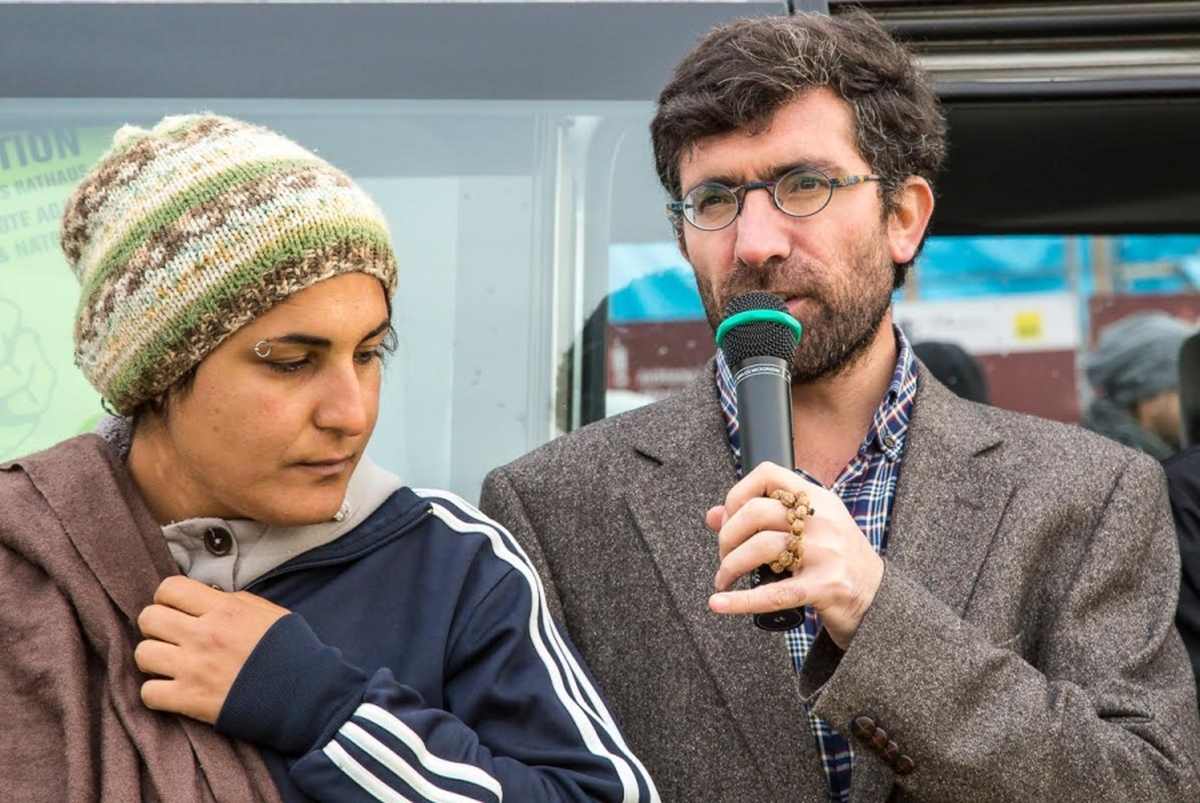
‘Amnesty International intervened in my case. Thanks to them I managed to flee to Greece.’ In a German AI report I read that Turgay was arrested on 29 May 1996 in Istanbul and on 7 June he was officially accused of “attempts to overthrow the constitutional order by force”. Several paragraphs down I read that while in custody Turgay was tortured and forced to sign false statements. ‘In Greece I also ended up in jail but after my hunger strike they let me go. And then I set out for Germany. First I went to Cologne, where I filed a request for asylum and had to stay in a Lager. Later they transferred me to Osnabruck where the refugees live in former Dutch barracks. I organized the first leafletings there. They transferred me to Hannover because of that. This is when I came to realize that individual protests would not change a thing because you could always be moved somewhere else. So I got in touch with various antiracist and anticapitalist groups I knew, and we came up with the idea of that march from Würzburg to Berlin under the banner of “Break Isolation”. We walked 600 kilometres, visiting various refugee camps on the way.’
Individual protests would not change a thing because you could always be moved somewhere else.
‘How did people react?’
‘At first they were afraid. I knocked on every door and talked with the residents. Most of them said that the idea was OK and they supported it, but that they were afraid of the reaction of the people from outside, that they would react negatively to protesting refugees. Eventually, we managed to gather a few hundred people and really break the isolation. We marched out of the camps and, protesting against the inhuman law, we walked across the land borders and thanks to the huge support we got we got away with it. It’s a big success!’
‘What are you planning to do now?’
‘We want to put a ship up at Oranienplatz.’
‘A ship?’
‘Yes, a regular, big fishing ship which the refugees use to get to the coast of Europe, and organize a refugee information centre in it. However, the district authorities are not very keen on this idea so we will probably have to put up a building which only looks like a ship.’
‘How about your personal plans?’
The society is too content, capitalism feeds people too many sweets…
‘In my case it’s hard to tell. My papers are valid to March 2016. I don’t know if the German government will decide to get rid of me after it. At the rbb site, which is a Berlin radio station, there was my photo with a caption below saying I am a terrorist who is inciting people to rebel, so we’ll see. I’m sure I’ll keep on writing my texts, though. Recently, I published an article about the impossibility of rebellion in Germany because political activity here comes down to a hobby, a kind of afternoon activism. The society is too content, capitalism feeds people too many sweets, you understand? There’s more potential for rebellion in Greece, for example, or Spain, or Rojava [Western Kurdistan].”
***
‘How many people got on the bus that took you from the Brunswick Lager,’ I ask Alnour, drinking the first sip of green tea. I completely forgot I had ordered it.
[easy-tweet tweet=”At the beginning there were seven of us” user=”krytyka” hashtags=”politicalcritique”]
‘At the beginning there were seven of us.’
‘That’s not many.’
‘Sure. But when we reached Berlin there were 70 of us!’
‘Where did these people come from?’
‘We drove from one Lager to another and convinced people to join us. It wasn’t easy because we had to use several languages. Still, it was a piece of cake compared with the plain fact that people were scared of committing some crime and being deported. They had been broken by this prison atmosphere. You know, in Lagers you feel as though you die every day. Plus all the time somebody was coming and egging us to sign something because if we didn’t there would be one threat: deportation.’
In Lagers you feel as though you die every day.
‘What did you arrival in Kreuzberg look like?’
‘I remember we were pretty tired. Although there were people who felt just fine after this two-week trip. Some of us had spent over ten years travelling to Europe!’
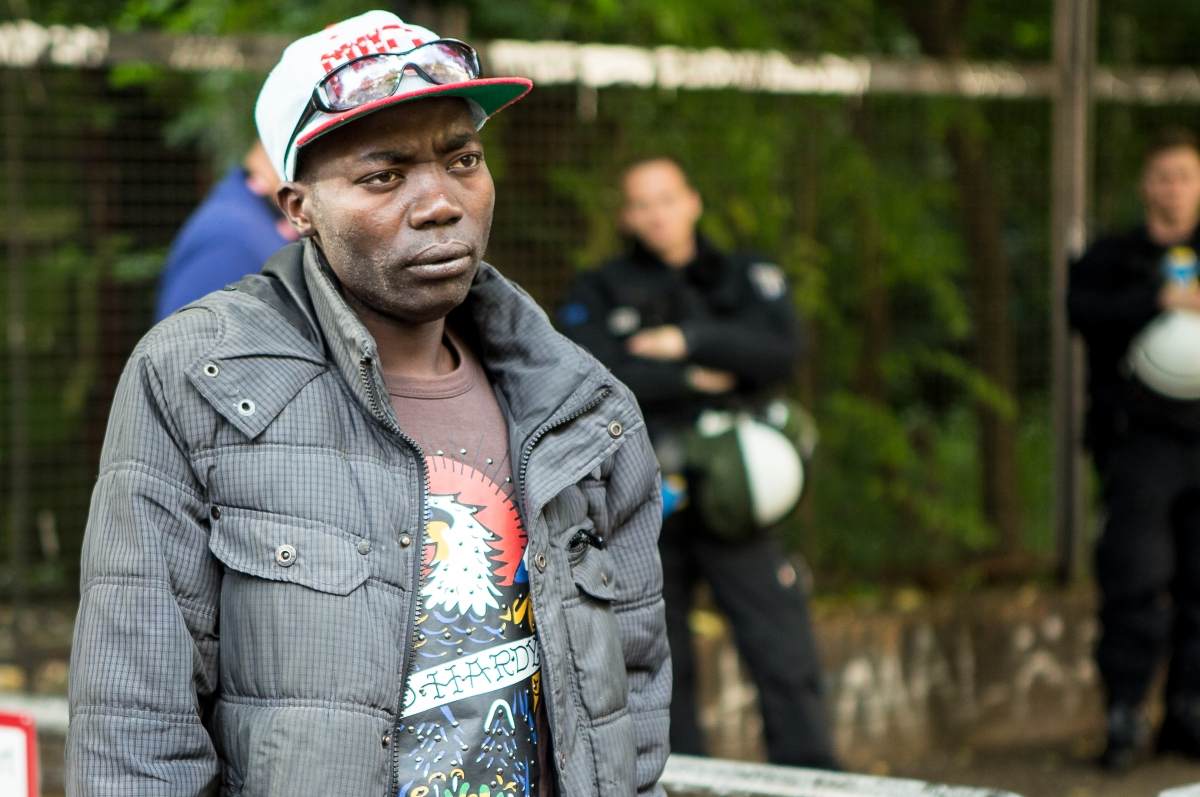
***
One of these people is Trésor. I meet up with him in his flat. He rents a studio in Neukölln, a few blocks off the crowded Sonnenallee. We meet late in the evening because Trésor works all day. At first I answer his questions. He wants to know where this article will be published, what ideology Politcal Critique promotes, if we operate non-commercially, if we publish our articles only for hits and ads. After this brief interrogation he explains that he spent too much time with journalists who were not interested in his story at all.
‘It was the worst in Morocco. They popped in for a bit, shot some pics and ran off to sell them to their publishers. They didn’t even ask for permission. Do you know I didn’t care about politics at all before I came to Europe?’
‘It’s hard to believe it after talking to your friends from Berlin.’ Like Turgay, Trésor is in almost every picture from every demonstration, occupation and march held by refugees.
‘You know I had ten years to think about it all. I can even recall the exact moment when I had, let’s say, the epiphany. I was in an Algerian prison. It was in 2008. I had just found out that I would get deported to Mali, to the Sahara. It didn’t make much sense because I’m from Cameroon. But nobody cared. They wanted to get rid of me. Why are they deporting me? I kept asking the same question over and over again. And I couldn’t find any reasonable answer. At some point you just need to understand why everything you’re going through, you see, you experience, is happening in the first place, or you go mad.’
I was in an Algerian prison. It was in 2008. I had just found out that I would get deported to Mali, to the Sahara.
‘And when did you understand?’
‘When I reached Morocco after the deportation. I started reading the first reports on refugees and migration politics written by Doctors Without Borders. The Moroccan authorities are paid big money by the European Union to stop migrants from leaving Africa. They prevent them from sailing off to Europe and deport them to the African interior, though they know the migrants will come back after several months. It’s a trick the politicians pull to make money.’
‘How did you manage to get these reports?’
‘It wasn’t that hard. I simply went to a meeting organized by the Doctors Without Borders. I wanted very much to understand why these things keep on happening to me. Most migrants I met didn’t even ask this kind of questions. They are sort of coded to do one thing and one thing only: to cross the border and get to Europe. They don’t have the energy, time or competence to analyse the political dimension of it all. That’s why I got involved in the activities of Coalition Internationale des Sans Papiers et Migrants [The International Coalition of Undocumented Migrants] and set up my own blog Voix de migrants [The Migrants’ Voice]. I’d like people to comprehend the situation they are in.’
‘What do you publish on your blog?’
‘News about what life is like here in Europe. I upload photos from various political events and short bits about different important changes that influence migrants’ life, such as the new law that the German government wants to push through.
‘Were you involved in the activities at Oranienplatz or the school from Ohlauer Strasse in any way?’
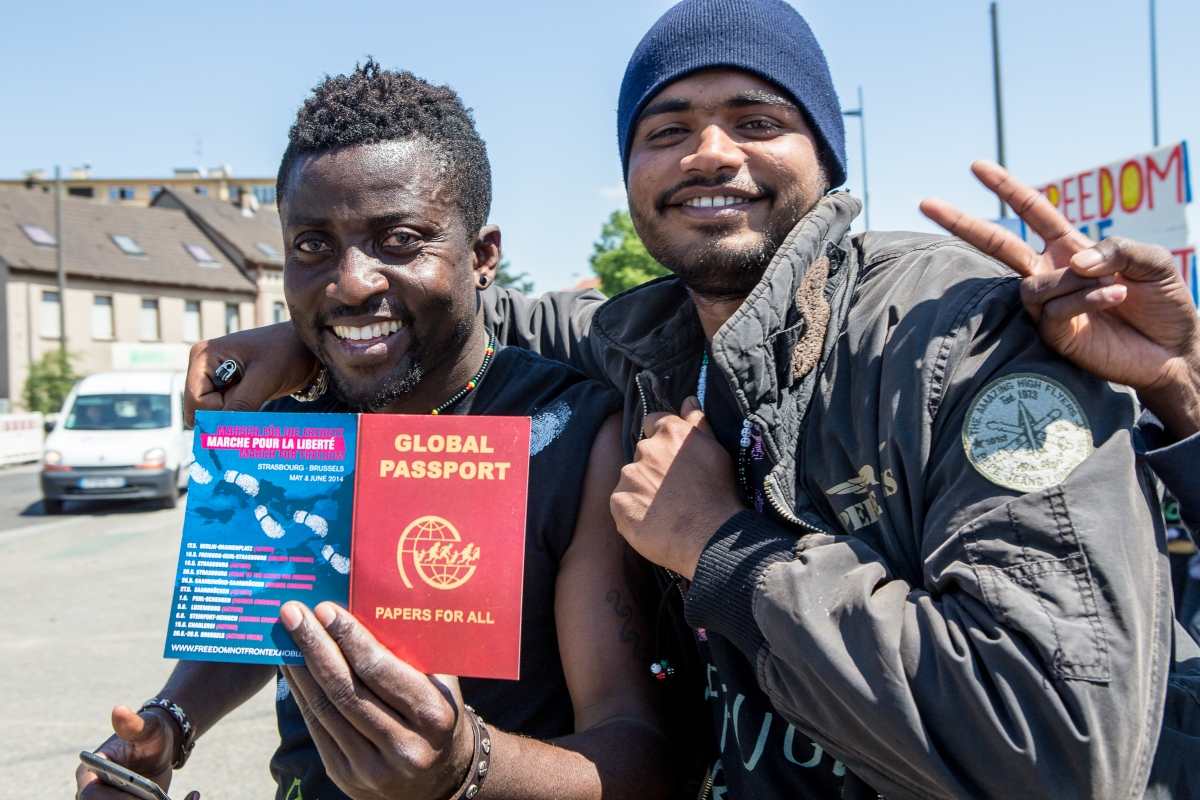
Why do you, Europeans, always need to dominate? I don’t get it.
‘I’ve got loads of friends there and I collaborate with them a lot. We went to the Freedom March together from Strasbourg to Brussels but I rarely dropped in at the Oplatz. I arrived in Germany in 2013 so I wasn’t there when all of this was being launched. I went there several times and saw that there were lots of divisions, and I had the impression that the German activists wanted to dominate all the time. It much grates on my nerves when someone says they’re allies but later it turns out they’d rather be dictators. Why do you, Europeans, always need to dominate? I don’t get it.’
***
‘Was anyone waiting for you in Kreuzberg? How did the tent camp come into being at Oranienplatz?’ I ask Alnour.
‘We took some tents with us. Refugees from Iran were waiting for us and they had their own tent. Many people from the district were also willing to help. They got down to building the camp straight away. Somebody was speaking all the time at the makeshift stage. The most important news was that it was all just a beginning, not an end. We were planning a big demonstration for 6 October. I think it was right on the first night that we formed the task group, working group and group responsible for preparing the demonstration. We also arranged the camp defence and changed the guard during the night to ensure people’s security.
[easy-tweet tweet=”Many people from #Kreuzberg were willing to help.” user=”krytyka” hashtags=”politicalcritique”]
We kept going on this initial enthusiasm for the first week. We felt free. We were forced into nothing. Finally we had a foretaste of normal life. But from then on it got worse and worse. The police started harassing us. Although it was much better than in the Lagers, there were several nasty incidents.’
‘What incidents?’
‘Let’s say that some people came and did everything they could to make us not feel too welcome just because we were black. It’s how it is, unfortunately. We feel there’s a difference in the way refugees from Africa and other countries are treated. At the demonstrations you can see some guys and immediately recognize they’re nazis. Some people from different Lagers said that they’d regularly had to fight fires because some military groups had set fire to the barracks. The fires eventually began at the Oplatz as well. Toilets burnt down first, later this building we had put up.’
‘How many people lived at the Oplatz?’
Let’s say that some people came and did everything they could to make us not feel too welcome just because we were black.
‘There were about three hundred of us at the most.’
‘And how did you deal with inner conflicts? I won’t believe there weren’t any.’
‘Sure there were. It’s only normal there are conflicts in a group as big as ours so there’s nothing to be afraid of. The first crucial conflict I remember regarded a hunger strike before the Brandenburg Gate. One group strongly opted for the strike but the majority believed it should be done at the end, not at the beginning. We have to agree that it’s a dangerous and very powerful move. They made up their minds and went ahead with the strike as early as in October. We agreed that we were still one movement, we supported each other but we wouldn’t strike in this way right from the start.’
***
In October 2012 I went to Berlin for a conference. Strolling down Unter den Linden, I was passed by a speeding ambulance with the siren on. It went to the square in front of the Brandenburg Gate and paramedics jumped out of it through the back doors. They ran to the people wrapped up in sleeping bags and sheltered by colourful umbrellas. Under the blankets and umbrellas lay a dozen or so people. All had hollow cheeks and yellowish eyes. I found out it had already been the tenth day of the hunger strike. Nobody was up to talking with me; the stronger protesters observed the paramedics with horror.
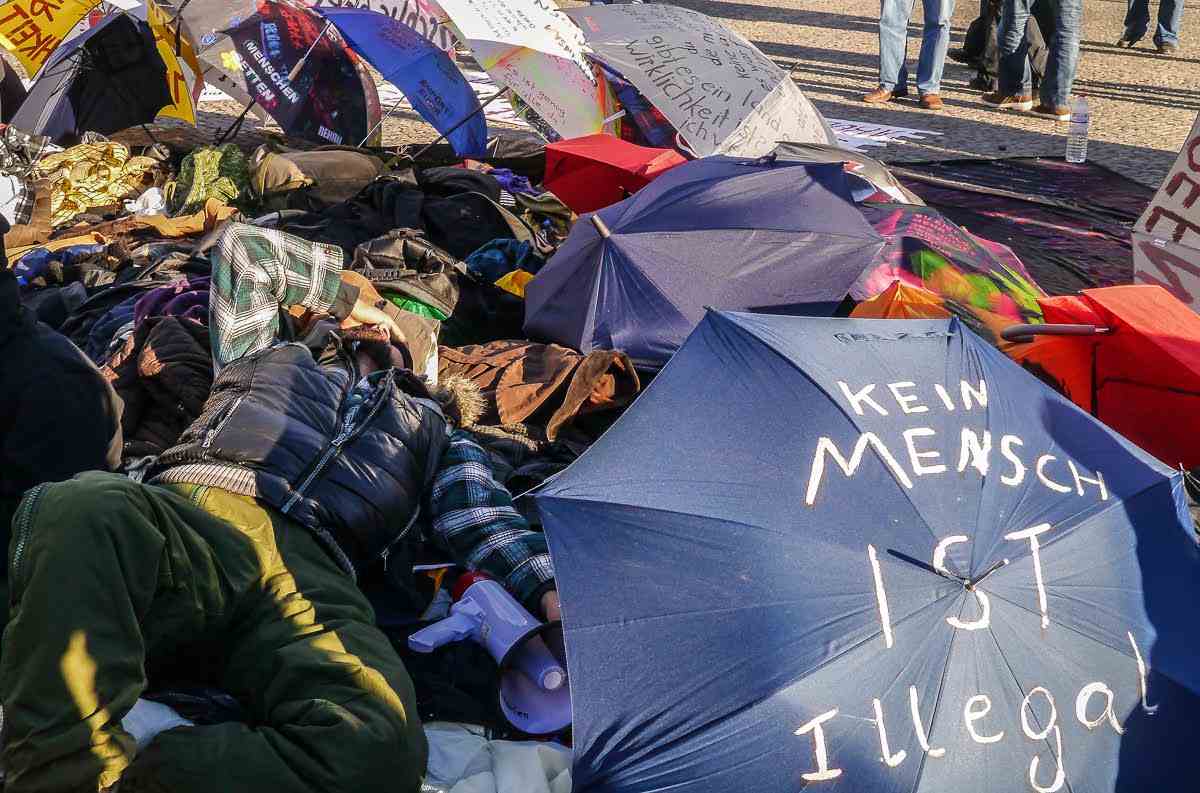
A man in a red vest with a cross on the back was rhythmically pumping the chest of one of the protesting refugees who had collapsed after nine days of hunger strike. He was taken by the ambulance and, as I was later to learn, survived.
The most astonishing thing was that both the protesting refugees and the paramedics’ actions were completely ignored by the passers-by. Literally several metres away from the group of emaciated refugees some tourists were taking selfies with the conmen parading in FRG and GDR uniforms.
[easy-tweet tweet=”The hunger strike can be really effective” user=”krytyka” hashtags=”politicalcritique”]
‘The hunger strike can be really effective but it was a bad time to start one,’ said Turgay three years later. He agrees with Alnour about this particular protest. ‘Besides, you have to prepare well for such a strike. Otherwise, it’s just damn dangerous. In the Istanbul prison we did different things to fight for our rights. Iranian inmates, for example, were experts in sewing up their lips. Get it? To protest against censorship. But hunger strikes were always left for the end, when nothing else could be done. Back in October it had just started, not ended.’
***
‘While they were on hunger strike at the Gate, what were you doing at the Oplatz, Alnour?’
‘To enumerate the more specific things, we were blocking deportations.’
‘How do you do that?’
Every day several people are deported.
‘You go to the airport and you block. People the authorities want to deport are escorted to the plane by the police. So we sit and block the gate. That’s it. Sometimes there were some scuffles, sometimes somebody got arrested. But if there are lots of us, the police let go. In this way we managed to prolong the stay of many people; it’s very important because you gain time to appeal and fight for the residency permits in Germany. Every day several people are deported. And because of the new acts, there’ll be more deportations still.’
***
When the hunger strikers at the Brandenburg Gate told me that the camp at Oranienplatz had been put up, I got on the metro and went there straightaway. I never returned to the conference about the future of Europe because I had the sense that the future was taking place right in those makeshift tents put up among the banners with the slogan: Kein mensch ist illegal [No-one is illegal]. All the brief conversations I had with the inhabitants of the Oplatz revolved around one main issue: bitter cold making everyday existence more and more difficult.
***
‘You moved to the school approximately two months after your arrival in Berlin, right?’ I ask Alnour.
‘Yes, it was in December 2012.’
‘Because it was cold?’
[easy-tweet tweet=”Kein mensch ist illegal” user=”krytyka” hashtags=”politicalcritique”]
‘Precisely. At the Oplatz there was no electricity or heating yet. It got bloody cold. At one meeting somebody said out loud what everybody was thinking: we’ve got to find some new place. It wasn’t so easy, of course. For two weeks we were looking for something. Finally we found the school. I stepped in with several people and we decided to stay there. I remember being asked if we were not afraid of squatting in that building. But if you have nothing to lose, you’re not afraid anymore.’
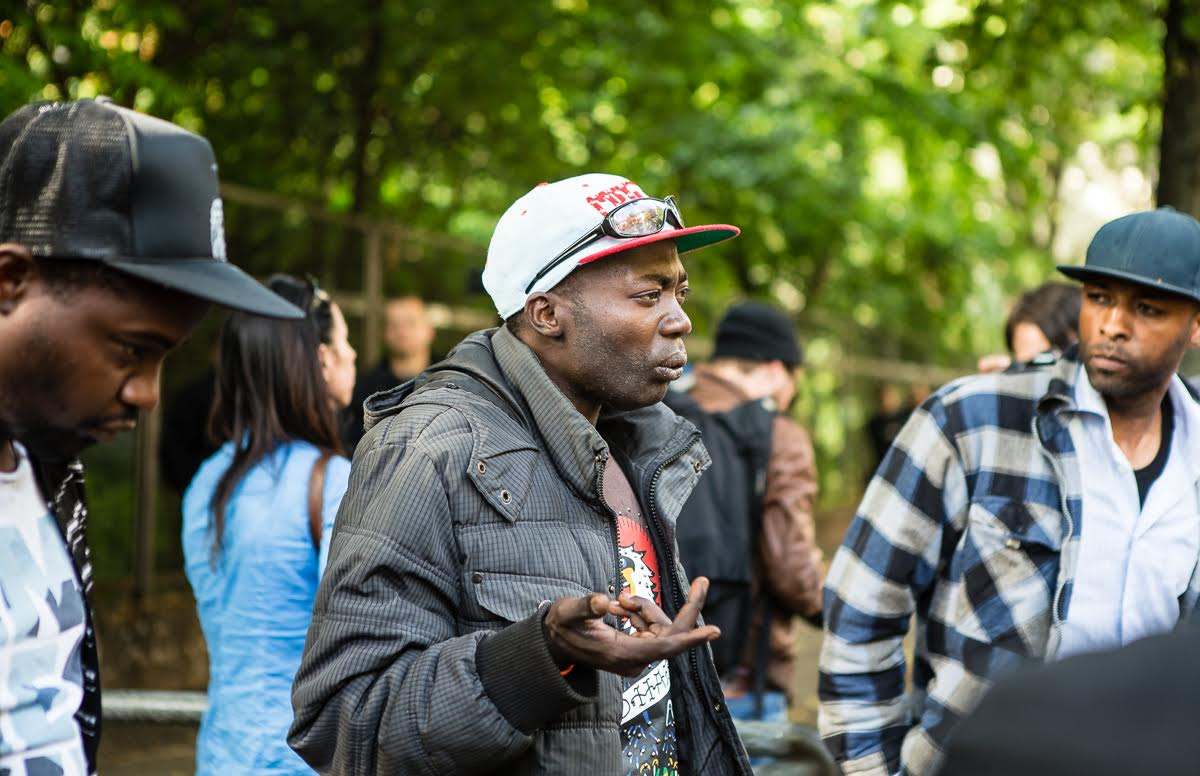
***
I heard that statement many times more from other refugee activists. Trésor repeated it the most I think.
‘I’m really scared of nothing now. To be honest, it makes me laugh how the German policemen get dressed up in their armour and think they’re gonna scare the shit out of us. What could they ever do to me? They can kill me all right. My death is nothing compared with what I witnessed all these ten years. My friends died of emaciation and I had to bury them. I can’t remember how many times smugglers put a gun to my head. Wait, I’ll show you something.’ Trésor takes out a thick envelope from behind a cupboard. On the table in front of us he lays down photographs. ‘I took these photographs usually when I thought I was going to die. As evidence of me, Trésor, making it to this or that place. Look, here’s my friend, the one who died.’
I took these photographs usually when I thought I was going to die.
‘You’re not actually saying that you made it to Europe in this dinghy?’ I raise one photo where Trésor is pumping up a navy blue dinghy with yellow letters (it looks only a bit better than the ones you can buy in a beach toy shop).
‘Sure I am! What did you expect? What do you think people use to get from Morocco to Spain? You pump up a dinghy and you row. It took us six hours. So you can really write that I’m scared of nothing.’
***
‘You just entered a building and took it over? The police didn’t throw you out? My friends told me that the 1990s were dead and buried and ever since then it’s been hard to squat somewhere longer than a couple of hours. Apparently police react very fast.’ I’m questioning Alnour about some details of taking over the school on Ohlauer Strasse.
‘You’re right. Since the beginning we knew that police would come one day. And they did. They gave us three days to think about what to do. After those three days some city official came and said we had one month to move out. After that month, we were given three more months. Next they gave us six more. At first the school was only a sleeping place. Now there’s only me and one more guy from the team that took over the school. At night we slept at the school and at day we went to the Oplatz,’ Alnour recalls.
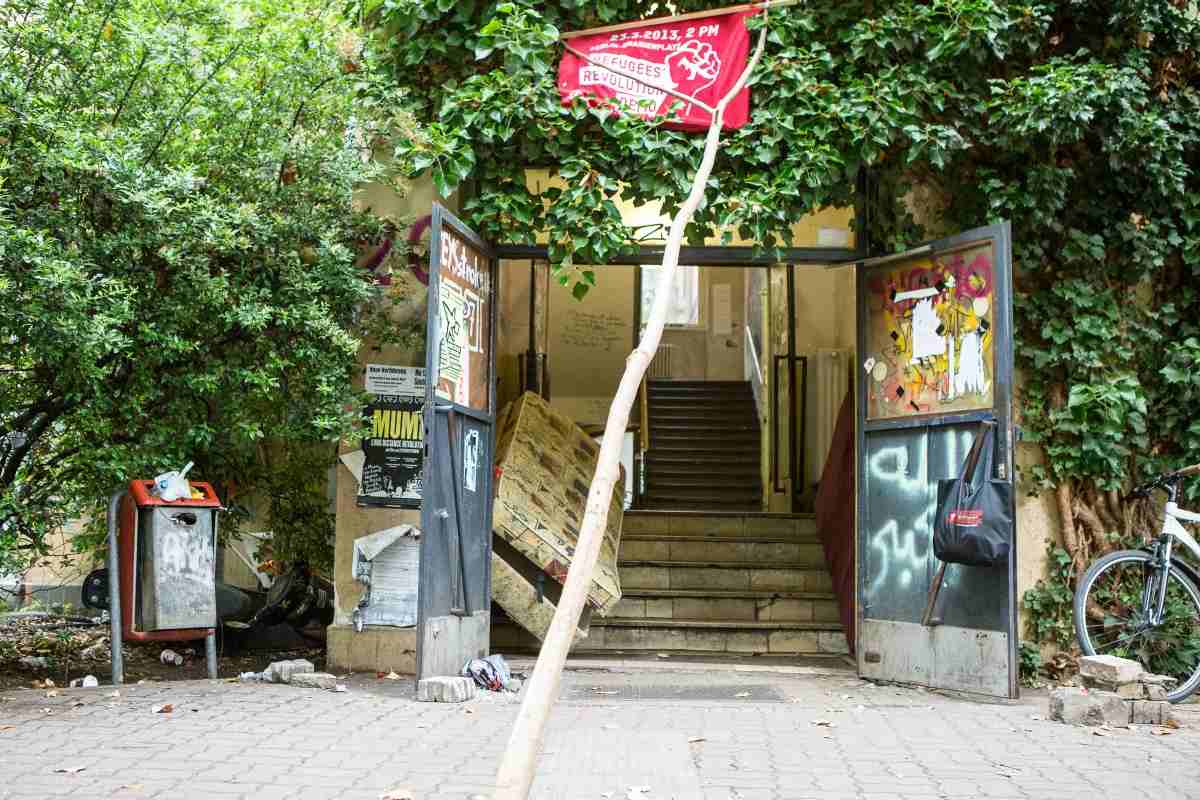
Several weeks after they seized the school, the place was buzzing with life. It became an informal centre of political activity in Berlin. Among others, the Blockupy coalition, which in March 2015 blocked the opening of a new seating of the European Central Bank in Frankfurt, organized meetings there.
‘Today the time when a lot of people frequented the school is just a memory, isn’t it?’
‘Yes, unfortunately. They’ve issued those cards and now it seems almost like a Lager. And we always wanted it to be a place where people who had nowhere else to go could find shelter. Not only refugees. Everybody who needs a place to sleep. At one moment there were more than four hundred people there. It’s a lot, really. It was hard to avoid conflicts. Especially in the conditions that were in the school.’
They’ve issued those cards and now it seems almost like a Lager.
‘Did you have heating? Toilets, bathrooms, showers?’
‘Yes, there’s heating. Toilets also work OK. But showers have always been a problem: there was only one for several hundred people. Can you imagine that? Eventually we asked a city official responsible for the maintenance of municipal buildings to put in some more showers. They always said they couldn’t do that because of something. They dismissed us obviously, day after day, week after week, and people had to manage with only one shower. Fights occurred more and more often. Finally one of them ended up tragically because in a scuffle one of the school residents died.’ Alnour has been describing all the previous events with an impressive calmness. But going back to this particular situation evidently makes him angry. He starts tapping the table top with his lighter.
Showers have always been a problem: there was only one for several hundred people.
All my interviewees mention the problems caused by the lack of showers. Each of them also reports on the murder case, which Alnour talks about. In the overcrowded building on Ohlauer Strasse arguments gradually changed into altercations which in turn changed into fistfights. Tired, hungry, threatened with eviction and deportation, the residents found it increasingly difficult to live together. At one stage it was obvious that somebody would finally cross the line or would try to back his arguments up with a gun. And that’s what eventually happened in the queue to the shower. Daniel Mützel, a German activist who closely observed the events in the school, says openly, ‘It’s politicians who consciously killed them [refugees] off with those showers. I was present at the so-called negotiations and said that I knew a person who could fix showers in the school for free. But they would not allow that. So things turned out the way they did.’
‘After the death, we took to the streets again and demanded the showers not only in official letters sent to the city council but also at the demonstrations in front of the railway station. Authorities were to blame for the death. They knew what the situation was and didn’t want to do anything about it. Instead of showers we received an eviction notice,’ Alnour goes on to say, increasingly annoyed.
[easy-tweet tweet=”Instead of showers we received an eviction notice” user=”krytyka” hashtags=”politicalcritique”]
‘But did they tell you to get out immediately or somebody met with you to work out a compromise?’
‘There were many meetings. Each one more pointless than the one before. They insisted on us leaving the school. They even promised to arrange some new place outside Berlin, then in Berlin but someplace else. They did everything to kick us out. And we had fled those very places they suggested, the Lagers. We wanted to organize an international refugee centre in the school and to never go back to the closed-off camps. Our plans were to start an information centre for newcomers but the authorities didn’t even reply to that idea.’
‘How did the eviction process take place? Did they first give you notice or send police cars right away?’
‘The notice was first. The thing is, I wasn’t even in Berlin at the time. Many of us from the movement were marching in the Freedom March from Strasbourg to Brussels. When we reached our destination I got a phone call from my friends who were staying in the school. They read the notice to me and it was clear that we had to leave the building on Ohlauer Strasse within three days. They also wrote that refugees could go to Spandau, another Berlin district. But as I was telling you, we never divided people into refugees and non-refugees. The school was a place for everybody who needed a roof over their head. What would have happened with those people if we’d agreed to the city’s offer?’
[easy-tweet tweet=”The school was a place for everybody who needed a roof over their head” user=”krytyka” hashtags=”politicalcritique”]
‘They would stay in street most likely.’
‘Yes. And some people even wanted to agree to that offer. Although they hadn’t seen the place where they were supposed to get transferred to. I was strongly against it. After several weeks they would kick us out of it anyway and we’d be back to square one, to the Lagers. So at one big gathering we decided that anybody could stay and fight for the school or could just go away. It was impossible to force people to stay. But we made it clear to those who wanted to leave that there was no way back.’
‘When did it happen?’
‘About one day before the eviction day. I couldn’t sleep all night. Not only me. So we sat up and discussed what we could do to stay. Very soon there formed a group of nine people who said they would be ready to do anything. We came up with this idea to go up on the roof.’
‘On the roof? Why?’
We didn’t fight every day for three years to be sent back to the Lagers.
‘To jump off if they wanted to kick us out. We didn’t fight every day for three years to be sent back to the Lagers.’ Alnour looks into the remaining coffee in his cup, which by now must be a disgustingly cold swill. I think he does so to let me chew over what he has just told me. ‘It wasn’t easy to get up on the roof. Together we took down this heavy door. But we made it up there eventually and got prepared for the following day. When the police show up, we will bolt up on the roof.’ Alnour reaches for his cup again. There’s nothing left now, I am sure.
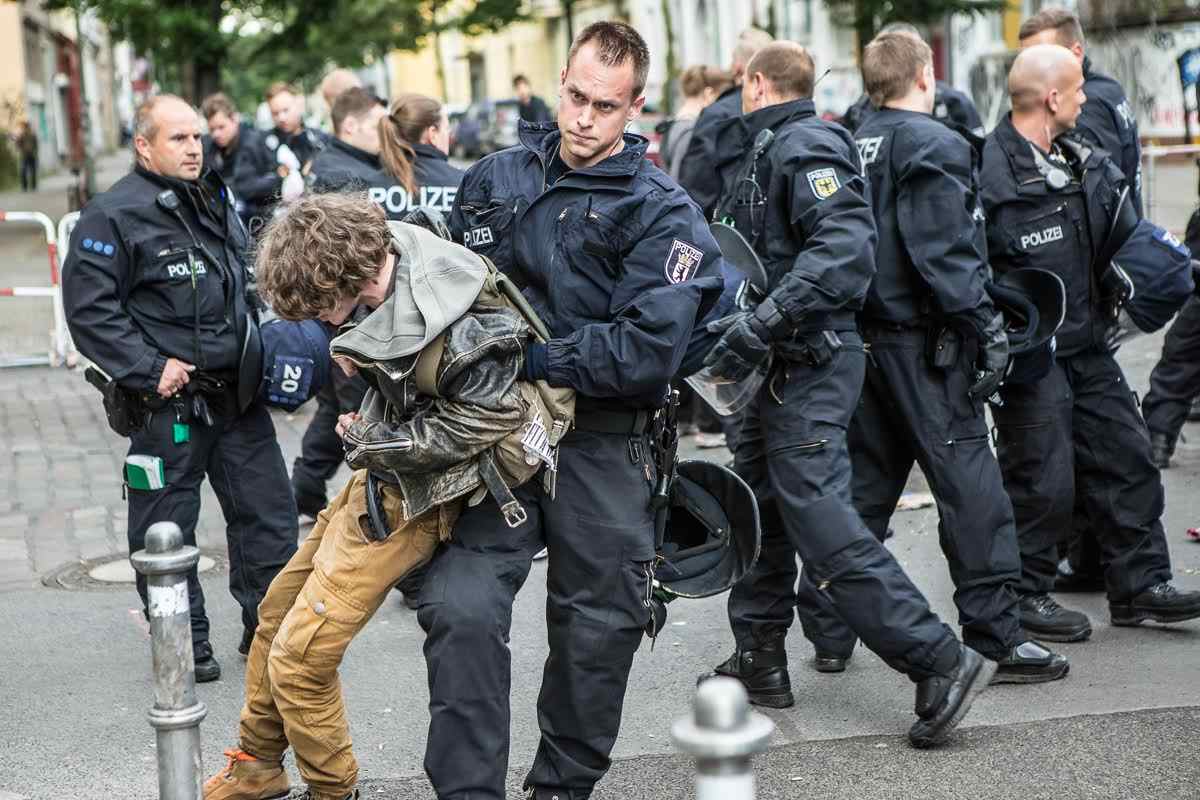
On 24 June 2014 the police arrived in Kreuzberg. Their sheer number was astounding for everybody, including the residents of the nearby houses. Police barriers were put up within the radius of several blocks from the school. In the evening the people who came home after work had to wait long while policemen checked their documents. ‘It was the biggest police operation in the history of contemporary Berlin. And you’re aware what 1 May celebrations look like here, aren’t you? It was incredible,’ a journalist I know was speaking, enthused.
[easy-tweet tweet=”They thought we were insane.” user=”krytyka” hashtags=”politicalcritique”]
Alnour distinctly remembers the day on which the police attempted to oust the refugees from the abandoned building on Ohlauer Strasse. ‘Many people went out of the school as soon as they saw police. They were leaving one by one. Some fifty people stayed inside. And one day earlier there had been four hundred of us. But we weren’t going anywhere. We barricaded ourselves from the inside. When we saw that the policemen were trying to get into the building we ran up to the roof. We had nothing to lose by then. Somebody took bottles filled with water and blocked with rags. You know, looking form below it’s hard to tell if it’s water or petrol.’ The Sudanese is laughing for the first time since the beginning of our conversation, recalling how they succeeded in scaring the armed policemen. ‘Around the school we had poured some real petrol so that they thought we were planning to set fire to the building. They thought we were insane. After the first day we were sure that they were more scared than us.’
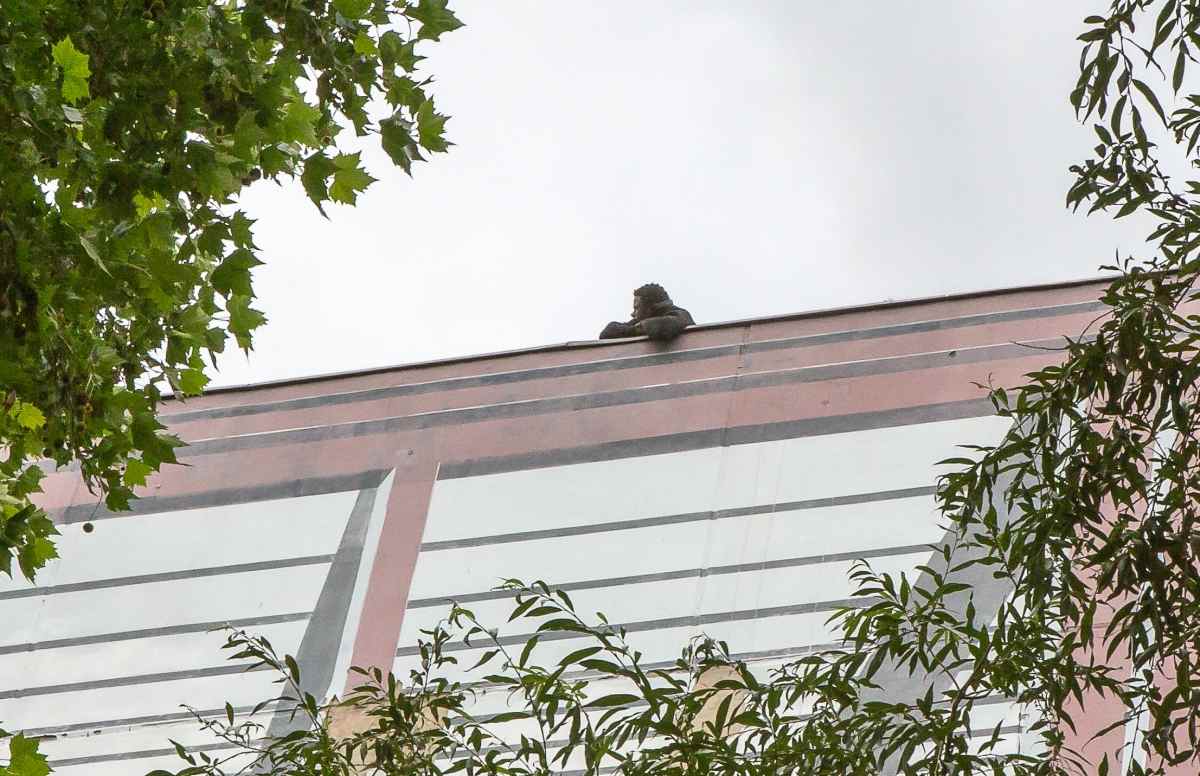
‘What did you see when you were standing on the roof?’
‘Legions of police, barriers. I’m telling you, were they many… Including the negotiator who was trying to convince us to get down from the roof and out of the building. No chance in hell. We knew well how it would end and we were determined to stay.’
‘How long did it all take?’
‘Nine days. We had plenty of time to think about what we really wanted. We came to the conclusion that we had to organize an international refugee centre in this school. We included this idea in the list of our demands. We wanted to divide the whole complex of school buildings into two parts: one with sleeping quarters and the other with halls for various activities, such as informing people about their rights or meeting for discussions. And we meant to co-create the centre. After nine days we signed a final agreement with Hans Panhoff (who was responsible for building maintenance in Kreuzberg) and Jana Borkamp (city councillor). We were assured that our demands would be met.’
‘And then the police left?’
‘That’s right, they packed up and left. But they left the sentry box behind where there’s a guard now. You’ve seen it yourself.’
‘Do you remember how you felt?’
‘I was absolutely exhausted but what kept me alive was knowing that we won. We knew that we got huge support from people from outside. Unfortunately, this feeling of triumph didn’t last long.’
‘How come?’
I was absolutely exhausted but what kept me alive was knowing that we won.
‘After two or three months it looked as if everything would start all over. Again some city official came and told us to get out. They signed an agreement with us in front of lawyers and journalists. But they didn’t honour it. So we got in touch with our lawyers and they decided that we would have to take them to court. It came as a surprise to the authorities because they assumed they would silently kick us out but we were well prepared. At the beginning of October 2015 the court ruled they had no right to evict us. And the agreement we had signed was valid.’
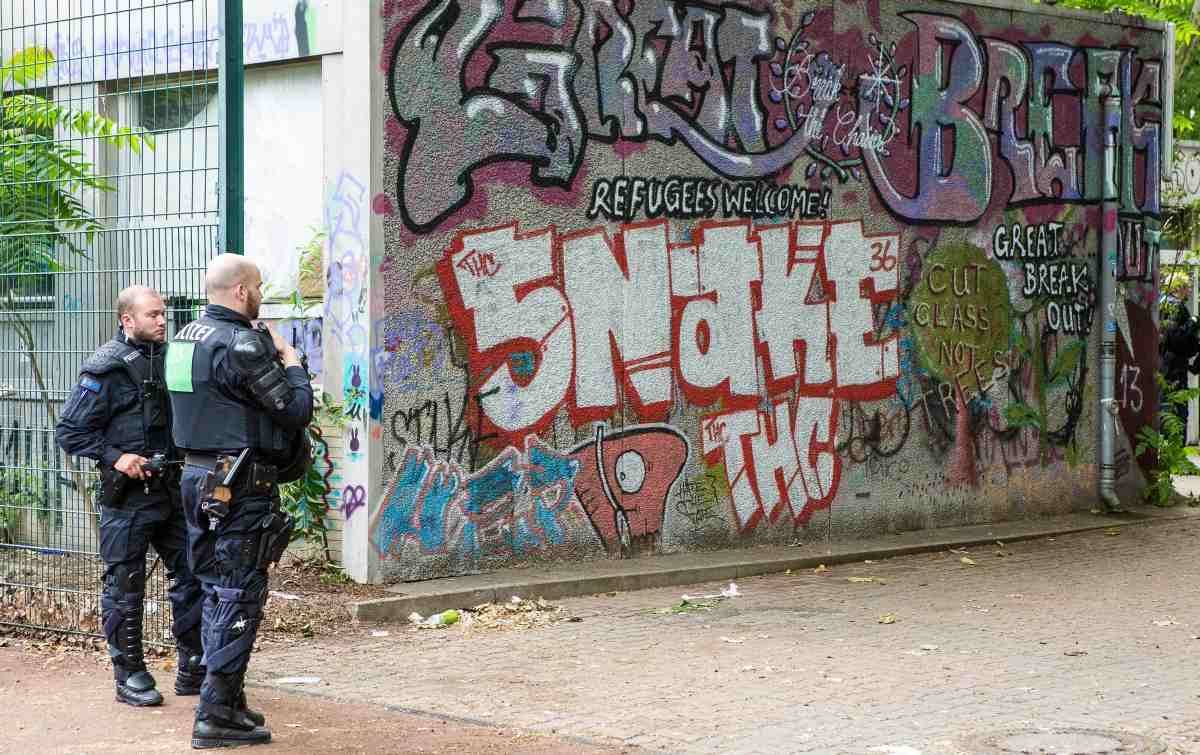
‘So does it mean it’s OK now?’
‘To the contrary. Because they failed to get us out, they’re trying to undermine our public support. I don’t know how many times I’ve heard that we’re criminals, that we’re trafficking drugs in Görlitzer Park. It’s not true, but even if some of us were doing it, I wouldn’t find it particularly surprising; we have no money, we can’t work, what are we supposed to do? Apparently we’re also very dangerous, that’s the reason for hiring the guards, putting up the chain over the gate and introducing a categorical ban on visits. Even when Angela Davis came to see us they didn’t want to let her in. Several policemen arrived and asked who that woman was. I was absolutely flabbergasted. I only told them to ask their boss, perhaps he was smarter than them. In the end we had to come out to greet her.
We’re in prison again. You leave the school, you have to show your badge, enter your last name, when you come in, it’s the same thing all over. This costs big money. I read somewhere that the security company is paid 110.000 euro a month. And what for? Did we we ever ask for those guys? Sure, we didn’t. But we’re going to hear the argument how much we cost German taxpayers.’
[easy-tweet tweet=”We’re in prison again.” user=”krytyka” hashtags=”politicalcritique”]
‘I’m wondering how many showers you can install for this kind of money?’ I butt in.
‘Exactly! I didn’t tell you but eventually they put in a second shower. Not to sound too excited, in one there’s only cold water and in the other only hot. Twenty-five people share two showers now. All this is just a game to make our lives uncomfortable. Right after the attempt to evict us, the guards followed us around everywhere. Even to the toilets. The fact that there’s no medical help either cost Mimi, one of our sister, her life.’
The fact that there’s no medical help either cost Mimi, one of our sister, her life.
Up to now Alnour has answered each of my questions like an experienced spokesperson. This is not surprising since he has told journalists the story about the refugee movement many times. But talking about Mimi costs him a lot. His bloodshot and yellowish eyes are evidently brimming with tears. I heard about Mimi from everybody involved in the Oplatz and school, I think. Even if their involvement came down to only reading something about it. For sure she was one of the leaders and faces of the movement.
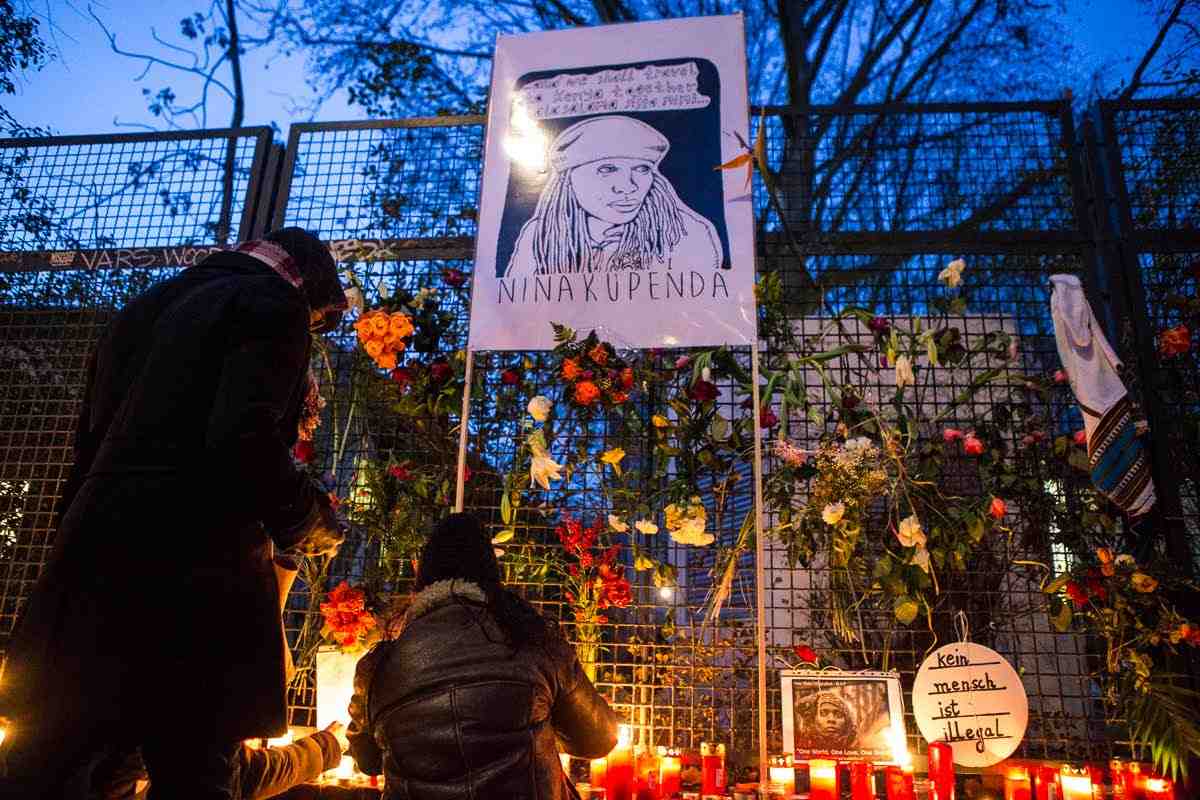
‘She died at the school,’ Alnour is saying. ‘After the defence against eviction she got ill. Later the disease turned into pneumonia. We were saying she needed to see a doctor but the security guards were unrelenting and didn’t let anybody in. She was so weak that the disease killed her.’
‘What’s the situation at the school now? How do you manage to survive?’
‘We get nothing from the state or the council. We live off what we get from people who live nearby. Sometimes, when it’s bad, we have some phone numbers of activists who are able to organize a charity collection and come with food the next day. Sometimes somebody comes and just leaves some pasta, rice, groats. Although, whether these things get to us or not, depends on the guards. Some of them are mean enough to send people away saying we’ve got plenty of food and we don’t need anything. And sometimes we don’t have anything to eat for one or two days. But I won’t dramatize, we’ve got used to these situations. It’s easier with clothes.’
‘How about your demands? What do you focus on now?’
And sometimes we don’t have anything to eat for one or two days.
‘We really want to stay here and finally build that social centre which we thought up, with an information centre, a room for studying German, a big space for meeting and a place where we could drink tea or coffee.’
‘I guess it won’t be easy. I heard that in the school there’s going to be a typical reception camp for refugees. And from what I understood it will not actually be a space with grassroots management.’
‘Yes, so we heard, of course. But we still care about doing things together so we don’t get divided as at the Oplatz.’ Alnour is thinking here about the clearing of the tent camp from Oranienplatz in April 2014. The refugees did this themselves, surprisingly.
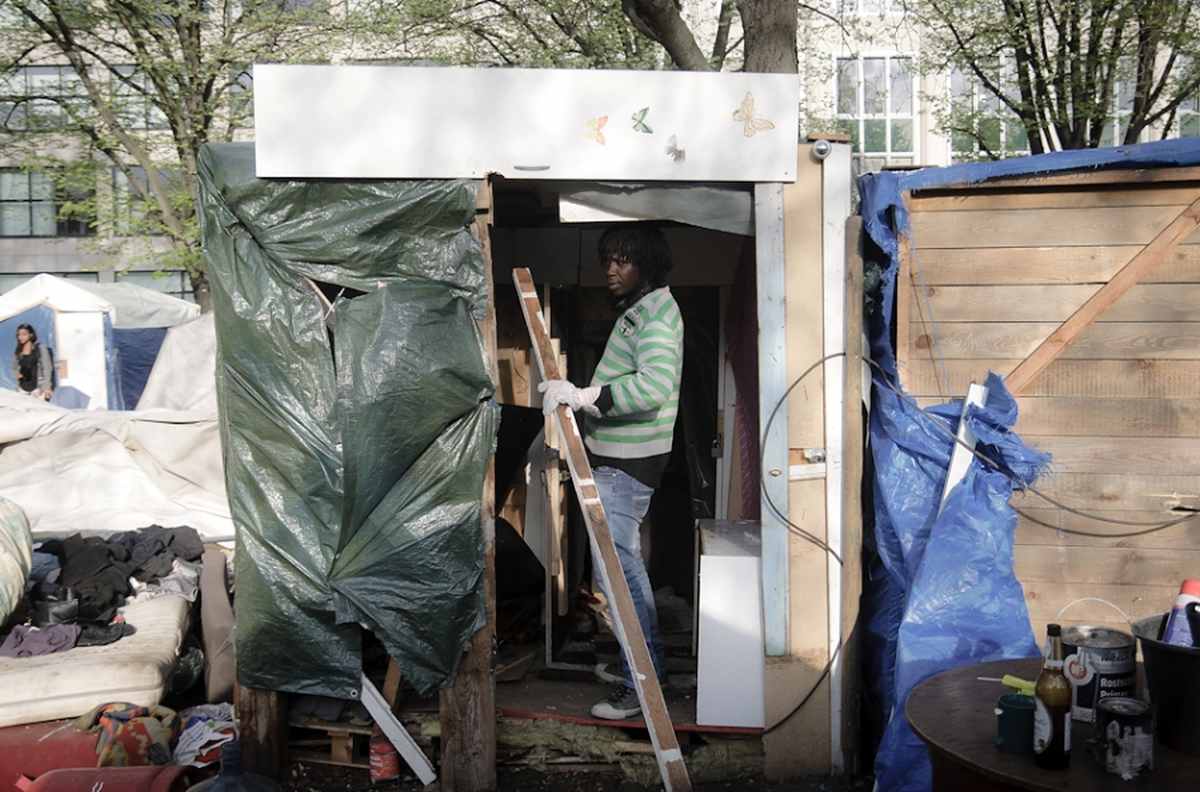
A year after the Oplatz was taken over by the refugees, Kreuzberg mayor Franz Schulz from the Greens, who accepted the presence of the camp, was replaced by Monika Hermann. Conflicts within the group of activists from the tent camp were increasingly worse. The media frequently wrote how African immigrants were exploited by leftist activists. Although my interviewees hinted at that problem, all of them agreed that it never was as serious as the sensational articles suggested. Among the refugees there was a clear division into those who reached Europe through Lampedusa and the rest. In the end, the city authorities suggested that if refugees took down their tents on their own, they would be provided with flats. This led to an open conflict that ended up in a fight between those who were taking the camp down and those who didn’t trust politicians and wanted to stay longer at the Oplatz. ‘Imagine two guys fighting and two policemen standing next to them, watching. They would have reacted in any other circumstance. But then at the Oplatz they were merely watching people beating each other up with boards. It was particularly cynical, as if they wanted the refugees to finish each other off,’ Daniel is saying.
***
We’ve always wanted everybody to find a safe haven in the school.
‘To be perfectly clear, we’re not against new people in the school. We’ll welcome them with open arms. We’ve always wanted everybody to find a safe haven in the school. But the authorities who want to settle new people there need to treat us, the residents of that place, as partners in talks, and they can’t decide what will happen to the place where we’ve been living for three years without consulting us,’ Alnour asserts. ‘The German government is playing the game of dividing the refugees into good and bad all the time. And the German society tolerates this. When we arrived in Germany, nobody greeted us with balloons. OK, there were some people at Oranienplatz to greet our march but what I mean is that we didn’t feel welcome by everybody. You can see what the politicians have recently been saying about the Syrian refugees, as if people were escaping only from Syria. The German government doesn’t treat the refugees equally. I know people who fled Darfur in 2003 and still haven’t been granted asylum, while the Syrians are dealt with within several months. You can’t do it like that. It’s not fair. Anyway, everybody will be treated worse soon. The situation in the Lagers improved for some time after our protests. People were put in threesomes and foursomes, rather than being packed in overcrowded rooms. For some time the refugees were given money for their own expenses, and not vouchers. When I was in a camp, instead of money we got vouchers for drink and food, some clothes. There were fewer deportations too. But with the new law it’s going to be much worse than it was three years ago.’
***
When at the beginning of September Angela Merkel announced the opening of borders for refugees in response to the humanitarian crisis caused by the politics of Victor Orban, liberal journalists all over Europe wrote paeans about her. Even refugees trying to get across the well-guarded borders chanted the name of the German chancellor. Some took her portraits with them.
Even refugees trying to get across the well-guarded borders chanted the name of the German chancellor.
A month later the only person with an unflinching enthusiasm is an assistant of a CDU MP, whom I meet accidentally at the bar in a Kreuzberg café.
In front of the Office of Health and Social Issues (LAGeSo), where asylum-seekers coming to Berlin must go to register, there is chaos. Every day several hundred people queue up for hours outside, come rain or shine, or cold. They are waiting to be assigned appointments with a clerk. Heidi, an activist from Berlin, who went to LAGeSo, says that the atmosphere there is exacerbating every hour. The security guards hired to keep peace on the premises increasingly need to split up quarrelling people.
The conditions in front of the office are not the only issue against which Berliners are protesting. On 15 October, at a quarter past five p.m., several thousand people march to the Bundesrat near Potsdamer Platz to protest against the new law regulating refugees’ stay in Germany.
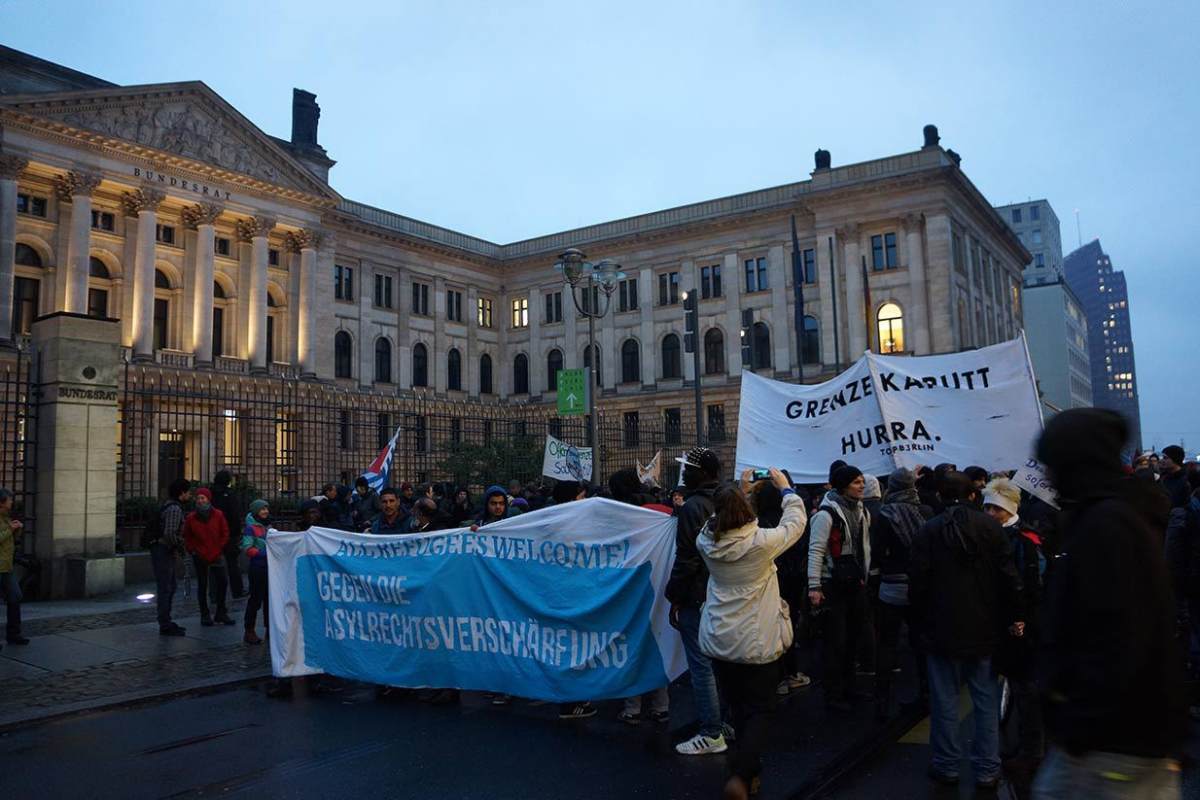
The Dublin III Regulation will be implemented again.
‘Dear friends!’ I hear from the loudspeaker placed in an old VW. ‘The new law which this government wants to pass deprives refugees of everything they have been fighting for so hard for the last several years. The Dublin III Regulation will be implemented again. This means that those who have left their fingerprints in an EU state other than Germany will be deported to that country and they will not be able to collect any social benefits. The government plans to increase the list of safe countries to which it will be possible to deport refugees and authorize the border guard to carry out the deportation,’ shouts one of the demonstrators, and the crowd starts to chant slogans about the police state.
In front of the Bundesrat I ask people why Merkel has changed her policy towards the refugees so abruptly yet again . All agree that the campaign conducted since the beginning of September was to ensure broad social support and construct the image of Germany as a country that supports refugees, but the new law demonstrates CDU’s actual intentions towards them. Getting rid of troublemakers and leaving compliant workers.
I try to find Alnour marching somewhere in the crowd. To no avail. I look around for Trésor. Later I learn that he was at work. After a dozen minutes or so I only find Turgay who is running after his son along the line of demonstrators.
***
‘Alnour, when you said you wanted to start at the beginning, I thought you would speak about the time before you arrived in Germany.’
‘Nothing to talk about. I was in Calais.’
‘And before that?’
‘On Sicily. But the camp was unbearable. Completely overcrowded. I ran away and worked at some farms picking fruit and saving money for the trip.’
‘Did you live in the tent camp in Calais?’
We travelled eight hours in darkness.
‘No. It wasn’t there yet. I paid the smugglers and got into a trailer. Somebody shut the door. We travelled eight hours in darkness. I guessed that something was wrong. We were supposed to go to England and it’s not an eight-hour-drive away. I know English very well. I wanted to finish school. At last the door opened and it turned out we were in Germany. Not everything works out as planned sometimes.’
***
I would like to thank Marta Madej from the Political Critique Club in Berlin for helping me collect data for this article and Johann Wiede from oplatz.net.
Translated from Polish by Bartosz Lutostański.
 The text written by Dawid Krawczyk and translated by Bartosz Lutostański is licensed under a Creative Commons Attribution-NonCommercial-ShareAlike 4.0 International License.
The text written by Dawid Krawczyk and translated by Bartosz Lutostański is licensed under a Creative Commons Attribution-NonCommercial-ShareAlike 4.0 International License.
![Political Critique [DISCONTINUED]](http://politicalcritique.org/wp-content/uploads/2015/09/Political-Critique-LOGO.png)
![Political Critique [DISCONTINUED]](http://politicalcritique.org/wp-content/uploads/2015/09/Political-Critique-LOGO-2.png)
Outstanding article, thank you.